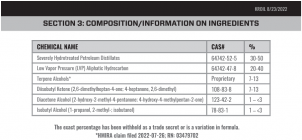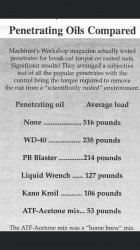There have been several comments made about "Kreen" manufactured by Kano Labs, but the discussions are closed now. I called Kano and they referred me to a local dealer. When I called the dealer he didn't know what I was talking about. I finally succeeded in getting him to order me some then overcharged me when it arrived.
I've been using Kreen since the early '80s, mostly in cars, so I have two anecdotal stories for you. First story involves a junk yard 389 Pontiac engine. We were trying to salvage as many parts as possible. I took a push rod that was almost black with carbon from years of neglect and cooked on motor oil. Several passes with Kreen on a shop rag and the rod came out looking like it had just been take out of the box new~!
Second was a set of injectors from an older high mileage GM engine which were black with burned on carbon and would not fire. We soaked them in Kreen overnight, rigged up a way to blow pressurized air through them, and fired them with a noid light. When installed in the motor, the engine fired on the first turn.
Yes, Kreen really attacks old built up carbon quite well~!!!
I use it every 3000 to 5000 in the gas tank of my 2006 Lincoln Town Car that shows 148,000 miles and has never had a tune-up. I'm an old guy who never drives very far and my Town Car gets 21.3 mpg just piddlin' around locally.
I've been using Kreen since the early '80s, mostly in cars, so I have two anecdotal stories for you. First story involves a junk yard 389 Pontiac engine. We were trying to salvage as many parts as possible. I took a push rod that was almost black with carbon from years of neglect and cooked on motor oil. Several passes with Kreen on a shop rag and the rod came out looking like it had just been take out of the box new~!
Second was a set of injectors from an older high mileage GM engine which were black with burned on carbon and would not fire. We soaked them in Kreen overnight, rigged up a way to blow pressurized air through them, and fired them with a noid light. When installed in the motor, the engine fired on the first turn.
Yes, Kreen really attacks old built up carbon quite well~!!!
I use it every 3000 to 5000 in the gas tank of my 2006 Lincoln Town Car that shows 148,000 miles and has never had a tune-up. I'm an old guy who never drives very far and my Town Car gets 21.3 mpg just piddlin' around locally.













